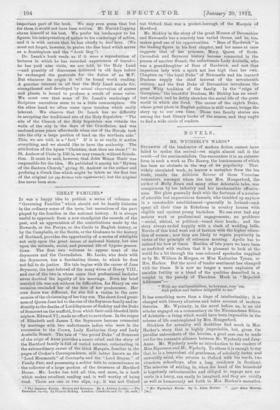GREAT FAMILIES,*
IT was a happy idea to publish a series of volumes on " Governing Families" which should not be family histories in the ordinary sense of the term, but narratives of the part played by the families in the national history. It is always useful to approach from a new standpoint the records of the past, and an appreciation of the contributions made by the Howards, or the Percys, or the Cecile to English history, or by the Campbells, or the Scotts, or the Grahams to the history of Scotland, provides the opportunity of a series of sidelights not only upon the great issues of national history, but also upon the intimate, social, and personal life of bygone genera- tions. The first two volumes to appear treat of the Seymours and the Cavendishes. Mr. Locke, who deals with the Seymours, has a fascinating theme, to which be does not fail to do justice. His tale begins with the career of Jane Seymour, the best-beloved of the many wives of Henry VIII., and one of the two in whose cases that professional bachelor never doubted the legality of his marriage. Even her brief married life was not without its difficulties, for Henry on one occasion reminded her of the fate of her predecessor. Her own doom was different, for she fell a victim to the cere- monies of the christening of her tiny son. The short-lived great- ness of Queen Jane led to the rise of the Seymour family and in- directly to the deaths of Lord Seymour of Sudeley and the Duke of Somerset on the scaffold, from which their cold-blooded little nephew; Edward VI., made no effort to save them. In the reigns of Elizabeth and James I. the Seymours became connected by marriage with two unfortunate ladies who were in the succession to the Crown, Lady Katharine Grey and Lady ,Arabella Stuart. The tale of "the proud Duke " of Somerset of the reign of Anne provides a comic relief, and the story of the Hertford family is full of varied interest, culminating in the extraordinary career of the third Marquis, familiar in the pages of Croker's Correspondence, still better known as the "Lord Monmouth" of Coningsby and the "Lord Steyne " of Vanity Fair, and possessing a nobler title to remembrance as the collector of a large portion of the treasures of Hertford House. Mr. Locke has told all this, and more, in a book which makes excellent reading and is well worthy of being read. There are one or two slips, e.g., it was not Oxford • The Seymour Ronny ilisPory end Romance. By A. Audrey Locke.—The Cavendish 1 %roily. By Francis Bickley, London: Constable and Co. [fie, sash.]
. .
but Orford that was a pocket-borough of the Marquis of Hertford. . .
• Mr. Bickley in the story of I he great Houses of Devonshire and Newcastle has a scarcely less varied theme, and be, too). makes good use of his opportunities. " Bess of Hardwick" the leading figure in his first chapter, and her name at once suggests that of her prisoner, Mary, Queen of Scots,. Cavendish and Seymour history become connected in the person of another Stuart, the Unfortunate Lady Arabella, who was a granddaughter of Bess of Hardwick, and met thaw. imperious lady with a spirit not less high than her own.. Chapters on "the loyal Duke" of Newcastle and his learnedi Duchess supply the chief interest of the seventeenth century, and the first Duke of Devonshire introduces the, great Whig tradition of the family. In the " reign of Georgiana," the beautiful Duchess, Mr. Bickley has an excel- lent subject, and he deftly sketches the social life of the great world in which she lived. The career of the eighth Duke, whose great place in English politics is still vacant, brings the story up to our own time. These two family stories are among the best library books of the season, and they ought to find a wide circle of readers.










































 Previous page
Previous page